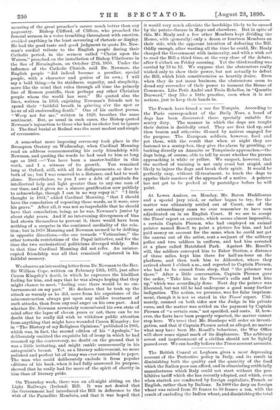We observe an interesting letter from Dr. Newman to the
Rev. Sir William Cope, written on February 13th, 1875, just after Canon Kingsley's death, in which he expresses the kindliest feeling for him, and says that he was always hoping that they might chance to meet, "feeling sure there would be no em- barrassment on my part." He declares that he took up the attack as warmly as he did, more from his experience of the misconstruction always put upon any milder treatment of such attacks, than from any real anger on his own part. And whether Dr. Newman accurately remembered his own state of mind after the lapse of eleven years or not, there can be no doubt that he really did wish to withdraw public attention from anything that might have wounded Canon Kingsley; for in "The History of my Religious Opinions," published in 1865, which was, in fact, the second edition of his "Apologia," he deliberately omitted the exquisite bit of irony in which he had summed up the controversy, no doubt on the ground that it was a little irritating, and might rankle unnecessarily in his antagonist's breast. Yet, as a literary achievement, no more polished and perfect bit of irony was ever committed to paper. The man who could deliberately exclude it from popular editions of his book, when it had fully answered its purpose, showed that he really had far more of the spirit of charity in him than of literary pride.


































 Previous page
Previous page